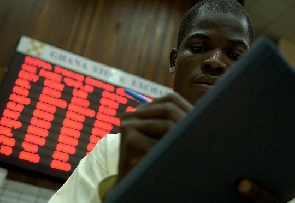We may probably have heard about how people have made so much money investing on the stock market. We probably have also been informed about how someone lost a great deal of money and the person, suddenly, became poor.
There is a plethora of such stories. Most of them, however, may not explain exactly how and why money was made or lost. Something, or many things, must have happened. That said, it is important to highlight the point that investing on the Ghana Stock Exchange (GSE) is one way to ensure financial security in the long term.
Investment Instruments
To begin with, there are so many financial instruments, securities or assets, on and outside the GSE, one can buy. There are bonds, notes and bills- debt instruments which usually pay the investor a fixed interest agreed upon prior to the inception of the investment. Some of these have interest rates that change, or ‘float’, usually according to what inflation or general market interest rates are.
There are collective investment schemes (mutual funds, unit trusts), exchange-traded funds (ETFs), property funds/real estate investment funds (REITS) and derivatives (options, forwards, futures). There are also alternative investments like private equity or venture capital, hedge funds, real property, commodities, and tangible assets like artworks.
Then there are equities/shares/stocks. The intention, generally, would be to buy and hold, with the expectation that the price would go up, then sell to realize some gains.
Equities, what does it take to own them?
Let us examine investing in shares/stocks/equities. These may be purchased on an Exchange (an organized marketplace) or over-the-counter (OTC) through a dealer network. An Exchange usually affords liquidity, compared to trading OTC. There are much more prospective investors to trade with on a Stock Exchange than otherwise.
Also, since it is regulated, it is safer to transact on an Exchange than OTC. Stock markets boast of millions of trades every day, done strictlyby the book’. Both party and counter-party are bound by rules which are well spelt out by the Exchange, so there is transparency. This may not necessarily be with OTC transactions.
Although the volume of transactions that takes place on stock markets is huge, many parties still transact on OTC markets. The stock market is regulated and has requirements. Some trades may not meet these requirements or the parties may wish to trade only among a few/specific parties. As a result, OTCs are primarily used to trade currencies, derivatives, bonds and structured products.
The Big Question
So why invest in stocks and on the stock market? The answer is: why not! Trading on the stock market thrives on timely and accurate information. The exchange ensures that listed companies provide company information in a timeous manner to help investors make informed choices.
This may not be the case on OTC markets. Information on listed companies is made available to the public and this is not the preserve of a select few. Transactions are open and streamlined with regulation to ensure that parties to a trade are not short-changed. All these make the stock exchange a safe medium for transactions.
There are further questions we may seek answers to before investing on the exchange. Why do I want to invest and is the stock market the most ideal place to invest? How much time can I allow my investment to run? What do I hope to gain? How well can I handle losses, unrealized expectations and unexpected turns in my investment?
Share price movements
The reason why we invest are obviously to make the most gains with the least risk in the shortest possible time. However, shares are, by themselves, described frequently as risky, volatile and long-term securities. For one to realize their objectives of making some gain off shares, one must be prepared to wait.
We refer to this investment allocation as patient capital. The price of shares on any reasonably vibrant stock market fluctuates. However, usually, given adequate time, the price trends upwards. For instance, on the Ghana Stock Exchange, FanMilk shares rose from GHS 3.50 in April of 2009 to GHS 6.90 at the end of the same year.
It, however, fell to GHS 2.37 by the close of 2010. Then, again, it rose to GHS 18.31 on December 31, 2013 before it settled at GHS 12.84 at the end of 2017. Similar movements were experienced with GCB and Unilever (UNIL). (See the price movement in the graph).
A Note to potential investors
An investor who will like to take some risk to be potentially rewarded with high returns should definitely explore investing on the Ghana Stock Exchange. It is evident that the stock market could record very high positive returns in an appreciably short time.
The returns could be quite higher than yields on bonds, collective investment schemes and other securities. Conversely, it could make significant negative returns in a short time as well.
However, a stock with good fundamentals may plummet in price but the price will likely rise to mirror the expectation investors have of that stock going forward. A well-researched stock should meet the investors expectation over a long period of time.
Shares may be large-cap, medium-cap or small-cap. Usually, the larger the size, the more stable the returns. Smaller-sized companies may usually be in their inception or growth stages, or just simply have a potential for growth.
They can either make it big or fail because of competition or evolving technology. An event can significantly affect their fortunes or performance. They are therefore much riskier. Large companies may not have that much growth potential, comparatively. They have a large market share and are less susceptible to crumbling because of competition. They are therefore viewed as less risky.
Share Price and Dividends
The share price of a small or young company could change significantly in a short period. They often plow back profits into the business to explore opportunities for growth. They may not often pay dividends. Larger company share prices, however, do not change that much over a short period.
Aside from technological advances which could see them grow (or begin to die due to obsolescence), they are quite stable. In the absence of growth opportunities to invest profits in, they distribute their profits to their shareholders in the form of dividends.
Investment growth potentials
The listed company’s industry also has a telling on the fortunes of its shares. Some industries are vibrant and are constantly progressing through innovation. Examples are the tech industry, and, to some extent, the financial sector. Some other industries are steadier. A notable example is the utilities sector. Firms in these sectors would therefore, either have some form of progression or be stable.
For these reasons, an investor who is willing to take more risk and potentially aggressively grow his or her investment would prefer to invest in stocks of companies with huge growth potential. These may be young, small or in a high growth sector. Since share prices fluctuate, it may be easier for younger investors who have many years ahead of them to invest in such stocks.
Young investors may not have as much need for income as older investors, so may not necessarily need shares that pay large dividends regularly. As we grow older, we become more risk averse because it may not be ideal to take big risks for potentially big rewards on our investments. Older investors closer to the end of their working lives should be more concerned with security, steady income and little or no fluctuations in investment values. They may acquire particular types of stocks with these considerations.
In conclusion
At the end of the day, we recognize the Ghana Stock Exchange as a viable marketplace for us to trade our shares and build our investment portfolios. The different types of companies potentially yield different types of returns and dividends.
We buy a particular stock depending on what type of investment expectation we have. With good research, good selection and tons of patience, we should be able to make it count. It is also very helpful to speak with a licensed investment adviser, stock broker or fund manager to help you take sound decisions.
Business News of Tuesday, 23 February 2021
Source: ...













